STORIES FROM AROUND THE WORLD
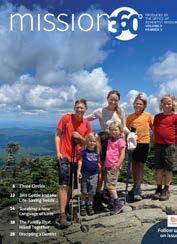
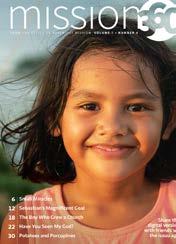
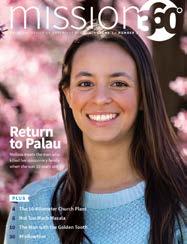

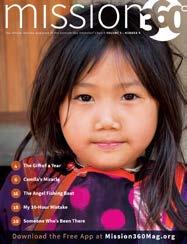
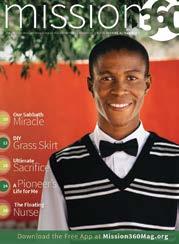
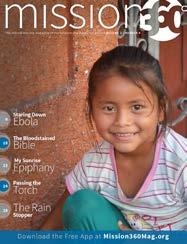
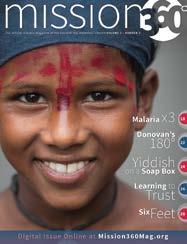
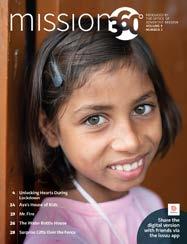

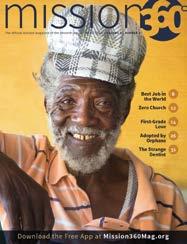
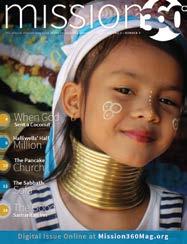
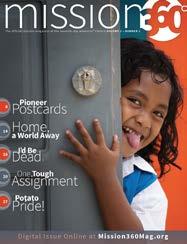
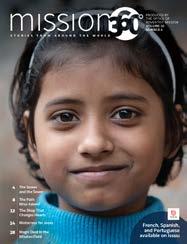
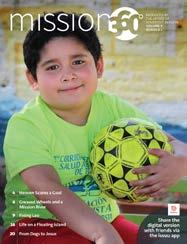

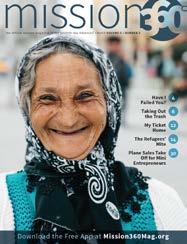
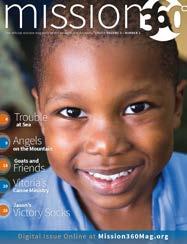
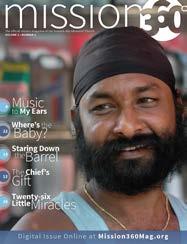
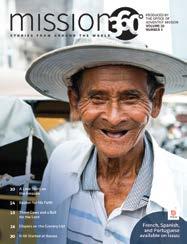


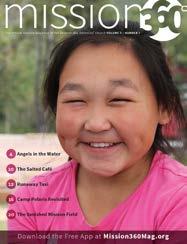

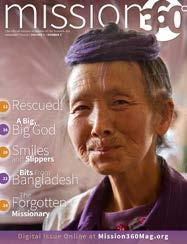

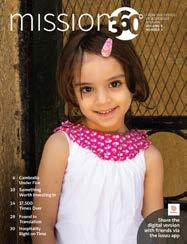

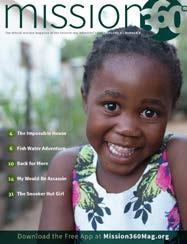
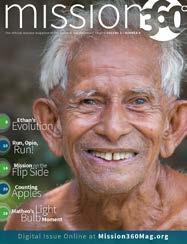

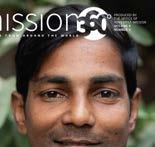
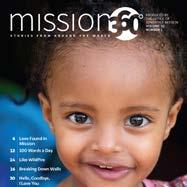
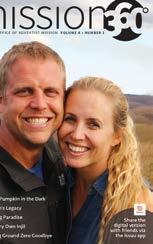



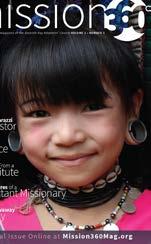
ANNIVERSARY PRODUCED BY THE OFFICE OF ADVENTIST MISSION
VOLUME 11 NUMBER 2
Happy 10th Anniversary Mission 360° Magazine!

You are reading a special 10th anniversary issue of Mission 360° magazine featuring a selection of some of the best articles over those 10 years. It’s hard to believe that 10 years have passed since the first issue rolled off the press.
I remember my fifth-grade teacher told me that as you get older, the days seem longer and the years seem shorter. For some reason his comment stuck in my mind. My teacher, who seemed old to me at the time, was likely still in the early years of his teaching. I share this because there were long days working on the magazine, yet the years seem to have flown by.
In 2013. G. T. Ng, then Secretary of the General Conference, called a group together to plan a new magazine whose entire focus was mission and
how mission offerings were making a difference around the world. The magazine would also show the shifting mission challenges, share outreach ideas readers could use in their own communities, and feature mission stories showing the various stages of Christ’s method of ministry as outlined by Ellen White.
The magazine’s stories would highlight how Adventists are creatively connecting with people, caring for and about them, and inviting them to know Jesus. May this magazine challenge and inspire you to think about, pray about, and care about doing something for mission.
Rick Kajiura Adventist Mission Communication Director
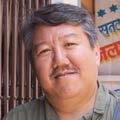
2 EDITORIAL
From the Office of Adventist Mission issuu.com/advmission
Chairman: Erton Köhler
Editor: Laurie Falvo
Consulting Editor: Gary Krause
Editorial Assistant: Marietta Fowler
Contributing Editors: Rick Kajiura, Elbert Kuhn, Andrew McChesney, Hensley Moorooven, Teen Nielsen, Ricky Oliveras, Karen J. Porter, Claude Richli, Jeff Scoggins, Gerson Santos, Karilyn Suvankham, David Trim
Editorial Advisors: Petras Bahadur, Jose Cortes, Jr., Kleber Gonçalves, Daniel Jiao, Sun Hwan Kim, Wayne Krause, Bledi Leno, Silas Muabsa, Paul Muasya, Umesh Nag, Josiah Nwarungwa, Joni Oliveira, Bill Quispe, Florian Ristea, Clifmond Shameerudeen, Reinaldo Siqueira, Daniel Stojanovic, Jean Taranyuk, Samuel Telemaque, Anthony WagenerSmith, Gregory Whitsett
Design: 316 Creative
Mission 360° is a quarterly magazine produced and copyrighted ©2023 by the General Conference Corporation of Seventh-day Adventists. All rights reserved. The contents may not be reproduced in whole or in part without written permission from the publisher.
12501 Old Columbia Pike Silver Spring, MD 20904-6601, USA Telephone: (301) 680-6005
Questions? Comments? Email us at Questions@adventistmission.org.
VOLUME 11 , NUMBER 2
Adventist® and Seventh-day Adventist® are the registered trademarks of the General Conference of Seventh-day Adventists®
Unless otherwise noted, Bible verses are quoted from the King James Version.
3
4 Greased Wheels and a Mission River VOLUME 9 • NUMBER 1 7 Three Cows and a Bull for the Lord VOLUME 10 • NUMBER 3 8 The Little Unusual Church VOLUME 1 • NUMBER 2 10 The 10-Kilometer Church Plant VOLUME 7 • NUMBER 3 12 When God Sent a Coconut VOLUME 3 • NUMBER 3 14 The Man with the Golden Tooth VOLUME 7 • NUMBER 3 16 Drumbeats VOLUME 6 • NUMBER 1 19 Beaten for His Faith VOLUME 10 • NUMBER 3 20 Mr. Fire VOLUME 9 • NUMBER 2 22 The King Tut Roadshow VOLUME 9 • NUMBER 4 24 The Mystery Book VOLUME 7 • NUMBER 3 26 Mission Changed Us VOLUME 8 • NUMBER 3 28 Vitoria's Mission Canoe VOLUME 3 • NUMBER 2 31 The First Missionary Kid VOLUME 1 • NUMBER 1
CONTENTS
FOLLOW US ON
Greased Wheels and a Mission River
Through
When I met Nguerabaye, I was struck by the ritual cuts heavily scarred into his face, a reminder of his heritage and former life. Beads of perspiration lubricated his skin, made leathery by the hot African sun. A Global Mission pioneer, Nguerabaye was working in Moissala, a town in southern Chad. He was on a mission to share with the people of this town the good news about a Man named Jesus who could bring them peace, joy, and salvation.
In tough, unwelcoming conditions, Nguerabaye—a married man with four children—was planting a new group of believers. He had already led nearly 50 people to baptism. Among those new believers, I met former prostitutes and alcoholics who had found new lives through Jesus.

Nguerabaye told me how he and his Global Mission partner had been treated as if they were animals. Mistaken for an occult group, they weren’t even permitted to buy produce at the market. But they just kept praying.
A boy in town had severe mental health challenges and was tied down with chains. The two pioneers came and prayed for him. After three days, he came to his senses and asked to be released. “I’m not sick, I’m healed,” he said. After his full recovery, the people of Moissala decided the pioneers were magicians.
I then discovered that through some glitch in the system, Nguerabaye had not received his modest living stipend for more than 12 months. I was shocked. Global Mission pioneers sacrifice enough without this type of neglect. But at no stage did he complain to me about his situation.
Finally I asked him how he and his family were surviving, and he simply said, “It is hard.”
“Why have you kept working?”
“I want to free people from guilt by telling them about the blood of Jesus.”
On Sabbath morning, hundreds of townspeople gathered to hear the gospel preached. Nguerabaye,
VOLUME 9 • NUMBER 1
our giving, we’re helping the church grow not only locally but also in areas we may not have heard of.
ORIGINALLY PUBLISHED IN 4
Brazilian missionaries Delmar and Natieli Reis (pictured with baby, Clara) are serving in Albania and running an urban center of influence because you give
leading from the front, was a proud parent looking out at his new children in the faith.
It was inspiring for me to meet Nguerabaye and several other pioneers working on the frontlines of mission in Chad. But they weren’t there by accident. They were serving because of the way you and millions of other church members around the world have sacrificially given through the years.
Off the Beaten Path
When I first flew to N’djamena, Chad’s capital, more than 20 years ago, I didn’t really know what to expect. Of course I knew that Chad was, in a sense, one of the world’s “forgotten” countries. The only people who seemed interested in the country were those exploiting its rich oil reserves.

Kind church leaders and members welcomed me like a long-lost family member. Leaders told me I was the first person from the General Conference to visit them. I don’t know if that was true, but it was easy to believe. In the middle of Africa, Chad isn’t often a logical stop-over destination; you have to make a deliberate decision to go there. Everywhere I went, people expressed joy that their church hadn’t forgotten them.
I quickly saw that although Chad may have been rich in resources, the country’s people weren’t benefiting. It has one of the lowest per-capita incomes in the world, and the Adventist Church

was operating with meager resources. The Chad Mission had one old vehicle, and the secretary treasurer didn’t even own a bicycle, yet the Seventh-day Adventist Church was alive and witnessing. They had programs and projects. They were reaching out to the community. People were finding hope in Jesus. There was a humble office for the Chad Mission, and there were churches, schools, and even a hospital. Throughout the country there were nearly 1,500 baptized Adventists, and a large team of Global Mission pioneers were planting new groups of believers.
How had that happened? I would suggest that it was through the work of the Holy Spirit and faithful church members around the world who had been systematically giving their tithes and offerings through the years, not knowing exactly where each dollar would end up. I think it’s fair to say that Chad still doesn’t loom large on the world church’s radar, and the average Seventh-day Adventist probably doesn’t give much thought to Chad or the church there. Many would have trouble finding it on a world map. And yet, thanks to the Adventist Church’s system of tithes and offerings, mission in Chad was funded by faithful church members who know nothing about mission in Chad!
Through our giving, we’re helping the church grow not only locally but also in areas we may not have heard of. We’re helping missionaries we may
Gary Krause, director of Adventist Mission
5
American missionaries Olen and Danae Netteburg (pictured with their children Lyol, Zane, Addison, and Juniper) serve at Bere Adventist Hospital in Chad because you give
never meet. We’re building schools and clinics we’ll probably never visit. We’re helping plant churches we may never worship in. We’re bringing life to the church’s mission.
After that first visit, I began thinking about the old expression “the squeaky wheel gets the grease.” Roughly translated it means that whoever makes the most noise gets the most funding. Today in the church some wheels squeak loudly and with great skill. And often it’s the big-wheel organizations that have the most interesting pictures, the most compelling videos, the most heart-touching stories that get the big donations—“the grease,” so to speak.
But what do we do about those parts of the world and those people groups that can’t or don’t “squeak”? Those that have no way to share heart-gripping pictures and stories with us? Do we just ignore them?
One of the beauties of the Adventist Church’s system of regular and systematic tithes and offerings, which Stewardship Ministries calls “Promise,” is that funds are pooled together to make sure the church also cares for areas of the world, such as Chad, that may not seem so “glamorous” or have the visibility of other areas. It’s like we’re adding life-giving water to a mission river that flows through parched lands around the world. We’re making sure that wheels that can’t squeak get attention.
Every time we return our tithes and give mission offerings, we’re helping support schools, hospitals, publishing houses, media outreach, church planting, and so much more. We’re helping the church stay alive in areas where many church members earn less than a dollar a day. We’re making sure that wheels that can’t squeak also get some grease.
A Worldwide Commitment
The Seventh-day Adventist Church finds its strength in mission. Through the years, Seventh-day Adventists have generously supported mission through their tithes and mission offerings because
they’ve believed the Gospel Commission. They believe we’re called to help the less fortunate, the poor, the sick, and those who don’t know about Jesus.
For decades now Adventists have talked longingly of “finishing the work.” But declining mission offerings prevent the church from starting new work in new areas, reduce the number of missionaries, and restrict our mission.
In recent years, millions of people from challenging areas of the world have found salvation in Jesus and have joined the Seventh-day Adventist Church. Thousands of new congregations have been established in new areas. How are these new believers nurtured? How do they receive resources, materials, and programs to strengthen their new faith? How do they receive ongoing pastoral care?
Life-giving mission offerings, given regularly and systematically, help sustain and grow new work around the world. And that is what the church is for!
 Reprinted with permission from Dynamic Steward magazine, vol. 24, no. 1.
Reprinted with permission from Dynamic Steward magazine, vol. 24, no. 1.
Please give your weekly mission offerings during Sabbath School, by scanning this QR code with your phone’s camera, or by visiting adventistmission.org/donate.
6
Many Adventists generously give to specific mission projects (such as Global Mission projects in Chad) above their regular and systematic giving. But it’s the regular and systematic giving that provides the foundation and framework for these projects to flourish.
Three Cows and a Bull for the Lord
One day as Mr. and Mrs. Mpofu watched over their livestock in Zimbabwe, they felt inspired to do more for God. So, they gave a portion of their animals as tithe and mission offerings.

“What moved us as husband and wife to give not only our tithe but also a bull as an offering is the current General Conference strategic plan I Will Go,” Mr. Mpofu said. “That challenged us very much because the Bible says everything belongs to God and we are just His stewards.”
“We’re following the Scriptures, learning that there are great blessings in giving,” Mrs. Mpofu added. “That touched our hearts so much because the Lord has been so good to us.”
Of the 31 animals the Mpofus owned, they tithed 3 cows and gave 1 bull for the mission offerings. This gesture not only encouraged the visiting church elders who collected the animals but also caught the attention of neighboring church members. Several others have pledged to contribute more to the mission offerings because of Mr. and Mrs. Mpofu’s example.
The mission offerings make a huge difference around the world and can make the greatest

Please give your weekly mission offerings during Sabbath School, by scanning this QR code, or by visiting adventistmission.org/donate Watch
impact when given faithfully and regularly.
Mr. and Mrs. Mpofu’s country, Zimbabwe, is home to Solusi University, which was founded in 1894. This Adventist institution educates students from all over Southern Africa.
Zimbabwe is part of the Southern Africa-Indian Ocean Division. This territory is home to more than 4.3 million Adventists.
Despite having a well-established history of church growth, there are still many mission struggles here. Your mission offerings help spread a message of hope in some of the most challenging areas, such as the growing cities.
Please pray for the Southern Africa-Indian Ocean Division as church members there faithfully follow God’s call in their lives. Even if you don’t have livestock to give, thank you for supporting the mission offerings.
ZIMBABWE
This story was adapted with permission from an article in the Southern Africa-Indian Ocean Division’s newsletter, Adventist Echo
Ricky Oliveras, Office of Adventist Mission
this
VOLUME 10 • NUMBER 3 ORIGINALLY PUBLISHED IN 7
story at m360.tv/s2221.
The Little Unusual Church
Pastor

Ndlozi has pastored here for years, but only recently as a Seventh-day Adventist. The members have attended for years, but only recently as Seventh-day Adventists. And not long ago, the sign outside posted the times of Sunday services.
But all that begin to change when Sonia, one of Pastor Ndlozi’s members, went to a flea market. There she met Andy and Carmen Rijavec, a Global Mission pioneer couple who were giving away Bibles. Sonia helped them that afternoon, and as they chatted, she discovered they kept the seventh-day Sabbath. Sonia was intrigued with what she heard and she wanted Pastor Ndlozi to hear it too.
Over a friendly dinner Pastor Ndlozi explained to the Rijavecs why he thought the seventh-day Sabbath was no longer binding. But later, he couldn’t get some of their questions out of his mind. Determined to learn more, he began to study the Bible with Andy and Carmen.
Over time, Pastor Ndlozi’s conviction to honor the Sabbath grew. But he faced daunting challenges. How would his relatives react? How would he support his family if he lost his job? And what about his wife, Selina? They had started Word of Truth together. Would she support him in a decision that would mean not only abandoning his religion but his members as well?

Pastor Ndlozi prayed for the Holy Spirit to soften Selina’s heart and then told her the news. “I couldn’t understand him,” says Selina. “Everything was going well for us and he wanted to throw away a good salary to join a church that didn’t even have a full-time job to offer him. I was so worried about how we’d survive. But then I had a strange dream.”
Selina dreamed about Mark 2:28, the Bible text where Jesus calls Himself “Lord also of the sabbath.” “That dream changed everything,” says Selina. “From that point we observed the Sabbath together.” With the support of his wife, Pastor Ndlozi was baptized and became a Seventh-day Adventist.
When Pastor Ndlozi’s employer heard the news, he issued him an ultimatum. “You must either quit or I’ll fire you,” he said. The pastor agreed to resign, but there was something he was determined to do first.
8 SOUTH AFRICA
J. J. Ndlozi has an unusual history at the Word of Truth Church in Pretoria, South Africa. In fact, it seems that just about everything at this church is a little unusual!
1 VOLUME 1 • NUMBER 2 ORIGINALLY PUBLISHED IN
Laurie Falvo, Office of Adventist Mission
“I wanted to tell my congregation about the Sabbath so they could decide the issue for themselves,” says Pastor Ndlozi. “But I wasn’t sure how to do it. I was afraid that if I just told them Saturday was the Sabbath, they’d never listen to me.”
Andy and Carmen couldn’t help Pastor Ndlozi present the Sabbath to his congregation because they didn’t speak Zulu. But they knew someone who could—Global Mission pioneers Hospa and Nonhlanhla Sibanda.
When Elder Sibanda presented the fourth commandment to the Word of Truth congregation, they listened intently, asked many questions, and invited him back for the following week.

At the end of Elder Sibanda’s second presentation, one of the church members looked squarely at Pastor Ndlozi and asked, “Pastor, when are we going to start worshiping on the Bible Sabbath?”
All eyes turned to Pastor Ndlozi. Slowly he stood to his feet and spoke, “My wife and I have already decided to keep the Sabbath. We have been waiting to see what you want to do.”
“Well, now we are waiting on you!” the church member replied.
Although the decision was not unanimous, there were enough members who wanted to observe the Sabbath so that Word of Truth became a Seventh-day Adventist congregation that very day.
Pastor Ndlozi posted a sign on the front door stating that services would be held the following Saturday.
Pastor Ndlozi asked Elder Sibanda to hold a series of evangelistic meetings at Word of Truth. At the conclusion of the meetings, 23 members were baptized, including Ndlozi’s wife, Selina.


Pastor Ndlozi has such a passion to share Jesus and the Sabbath with his community that Pastor Justino Paulo, the Adventist Mission director for the Southern Africa-Indian Ocean Division, made him a Global Mission pioneer.
Now Pastor Ndlozi holds evangelistic meetings every year in Pretoria and many of those who originally left his church are coming back. In fact, the Word of Truth Church is growing so quickly that they’re looking for a bigger building to accommodate their congregation.
Pastor Ndlozi is currently studying theology at Solusi University in Zimbabwe. “It is by the grace of God and the people that He sent into my life to encourage and strengthen me that I have been able to continue with this Sabbath message and preach it to the world,” he says.
Some of the people God sent into Pastor Ndlozi’s life were Global Mission pioneers whom you helped support. They reached out to him. He reached out to his wife and congregation. And they reached out to their former church members and community. And the Word of Truth Church just keeps growing—largely, thanks to you!
Global Mission pioneers venture into areas with no Adventist presence to plant new groups of believers. They’re laypeople who work within their own culture and speak the local language. To learn more about their unique ministry, visit www.global-mission.org
2
of
Church has grown so much that there is no room inside for the children to meet for Sabbath School
2 3 4
1 Members of the Word of Truth Seventh-day Adventist Church. Pastor J. J. Ndlozi is on the far left
The Word
Truth
3 Global Mission pioneers Pastor J. J. and Selina Ndlozi
4 Global Mission pioneers Elder Hospa and Nonhlanhla Sibanda
The 10-Kilometer Church Plant

In Quito, Ecuador’s capital city, a 10-kilometer race was just what an Adventist youth group needed to help them plant a church!

The idea originated in the home of Carolina, where friends regularly met for fellowship. Carolina, the leader of the church planting project, says, “We wanted to do more than just meet together and grow from each other’s experiences. So, we decided to plant a church in an unentered part of our city.”
The group’s initial attempt to share Jesus didn’t go well. “We knocked on people’s doors and asked whether they wanted to study the Bible with us,” Carolina says. “It was a bad idea! They said, ‘No, we don’t even know you. Who are you? What do you want?’”
The friends met again to pray about how best to connect with the people. “We decided to do a survey to determine their needs,” says Maria, a member of the church planting team. “We discovered that many of them were experiencing health problems.”
“We wanted to host a health fair with free medical consultations and lab work,” Carolina adds. “But it was going to cost around three thousand dollars, and we didn’t have the money.”
Every Wednesday, the friends went jogging as a group activity. One week, as they prepared for their weekly run, Carolina’s mother suggested that they use their activity as a way to raise funds. “You could have a race,” she said, “and charge a small
registration fee.” The group loved the idea and got busy planning.

On the day of the race, more than 950 people participated, providing enough money to conduct the health fair and rent a church building! The health fair and other outreach activities resulted in new friendships and new faces in church on Sabbath mornings.
Next to the church is a bakery owned by Noemi and Miguel. Sometimes during the week people from the church bought things from their store, and one day Noemi asked them about the church. They invited her to study the Bible with them the next Sabbath, and Noemi accepted. She began attending church regularly, and as her faith grew, she prayed that Miguel would join her. Initially, he showed no interest, but after a few months, as a birthday gift, he agreed to join her for one Sabbath only.
“My first impression was that I didn’t know anybody, but everybody knew me,” Miguel says. “I felt an immense love.”
Miguel wanted to learn more, so he and Noemi asked for Bible studies at home. Eventually, they gave their hearts to Jesus and were baptized. Their bakery is now closed on Saturdays, but business has doubled on Sundays!
“It’s a radical change,” Miguel says. “We used to have a lot of problems, but now it’s different. We study together, go to church, sing, and pray to God.”
Miguel and Noemi’s family is just one example of those who have come to know Jesus, and they’re excited to share what they’ve learned.
“We have a small group that meets in our house once a week,” Noemi says. “Our goal as a family is to share God’s Word so others can know Him too.”
About 10 people have so far been baptized as a result of the young people’s effort, and the church members pray that their efforts will continue to spread God’s love throughout the community.
ECUADOR
1 2 VOLUME 7 • NUMBER 3 ORIGINALLY PUBLISHED IN 10
Ricky Oliveras, Office of Adventist Mission
“I can see a difference in many of the people’s lives, Maria says. “Before they used to live without purpose, without knowing what’s going to happen tomorrow. Now they have the hope that Jesus is coming again, and they’re sharing that.”
“Our dream is that this church will grow and that we’ll
all see each other in heaven,” adds Anavelen, another member of the church-planting team.
Your donations have made it possible for Global Mission to help this church plant. Thank you for supporting church planting projects like this one in major cities of the world.
1 More than 950 people participated in the 10-kilometer race
2 The youth group meeting in the home of Carolina, the leader of the church planting team
3 When Miguel and Noemi decided to close their bakery on Sabbaths, God blessed them by doubling their sales on Sundays!

4 Maria, one of the church planters who conducted a survey to determine the community’s needs

5 Carolina leads a weekly Bible study in Miguel and Noemi’s home

6 Church planting couple Anavelen and Sebastian help children at the church plant learn about Jesus
Ways to give

Please support Global Mission to reach those who don’t know Jesus.
Online To make a secure donation quickly, visit Global-Mission.org/giving. Call Call 800-648-5824. Mail a check In the United States: Global Mission, General Conference 12501 Old Columbia Pike Silver Spring, MD 20904-6601 In Canada: Global Mission SDA Church in Canada 1148 King Street East Oshawa, ON L1H 1H8
3 4 5 6 11
When God Sent a Coconut
We need to get off this mountain now! But which way should we turn? I wondered, attempting to stifle a surge of panic. I tried to get our bearings in the fading light, but the thick foliage and towering ridges blocked my view.
I glanced at Dad. He was lying in the bushes, unable to control his muscles. We had no idea what was wrong. We were hopelessly lost. And we were running out of time.
Dad had flown to Kosrae to visit me, where I was serving as a volunteer teacher at a school in Micronesia. He is fit and loves to hike, so we thought that climbing the mountain behind the school would be a perfect adventure. My fellow volunteers, Ryan Thorpe and Tyler Hissong, joined us, and we set off in the early afternoon for what we anticipated to be a three-hour hike.
As we started up the trail, I began to think we had been overly optimistic. It was slick and muddy from intermittent rain, and we were grabbing onto roots and ferns to maintain our stability.
Finally, we reached the summit of Mount Finkol, where we gazed on the awe-inspiring beauty of rainbows, rugged mountains, and a glorious sunset.
Sunset! We were supposed to be back by now. The realization of our predicament registered forcibly. The trail, steep and not always visible, had been difficult in daylight. In the dark, it would be treacherous. We quickly snapped a group photo and began a hasty decent.
We scrambled down the embankments in the fading light until darkness descended on the mountain like black fog. Stopping to turn on my headlamp, I noticed that Dad was hydrating
again. It seemed like he was drinking an excessive amount of water. I was about to ask him whether something was wrong when Ryan yelled from ahead, “I don’t think we’re on the trail anymore!”
As we searched for the trail in the dense thicket, the moon broke free from the clouds. We huddled together, volleying questions back and forth. “Was the moon on our left or right when we started?” “Did we accidently cross a ridge?” “Are we on the correct side of the mountain?” Then Tyler lifted his finger to his lips. “Listen! Water.”
“It’s a stream,” I said hopefully, knowing that water always takes the quickest path downhill. “We can follow it down the mountain.” Dropping into a gully, we followed it several yards until we were engulfed in impenetrable vines.
Dad was walking slower and slower. “Hey, Riv, I don’t feel so well,” he called. “My muscles are cramping, and I feel nauseous. Do you mind if we rest for a second?”
We all welcomed the break, but as soon as Dad stopped, his condition escalated. He starting shaking vigorously and breathing quickly. His voice was soft and high-pitched. What’s going on? I wondered. Is he in shock? Dehydrated? I searched my mind for anything I had learned in nursing school that would explain his symptoms.

“How is your pulse, Dad?” I asked frantically. “Do you feel like you’re going to black out? Can you think straight? What’s five times two?” His responses frightened me, and he was getting worse by the minute.
My friends and I formed a plan. Tyler would stay with Dad, and Ryan and I would bushwhack up the ridge to see whether there was a way down.

12 MICRONESIA
VOLUME 3 • NUMBER 3 ORIGINALLY PUBLISHED IN 1
River Davis spent a year as a volunteer teacher at Kosrae Seventhday Adventist School in Micronesia.
Filled with fear that I might lose Dad, I heaved the machete back and forth, clearing the vines from my path. Finally, we reached the top of the ridge, only to find the vantage point obscured by towering trees.
This was too much. Grabbing onto a branch, I prayed like I have never prayed before. “God, we’re in a helpless situation. Please don’t let Dad die. Please get us off this mountain in time!”
With great difficulty, failing muscle function, and Tyler’s help, Dad was able to join us on the ridge. But as soon as he did, he started hyperventilating. He was mumbling, and his arms were trembling. Is this how it’s going to end, God? I asked.
“Dad, we have to keep moving!” I pleaded. “We need to get home.” Slowly, he rose to his feet. He urgently needed hydration, but our water supply was gone.
It was then that Tyler did something strange. He wandered off as if he were searching for something. Then he stopped at the base of a coconut tree, where a single coconut hung in the fronds. Shimmying up the tree, he knocked it to the ground. Realizing his intention, I hacked it open and held it up to Dad’s mouth.
Coconut milk is a good source of electrolytes, and Tyler had felt impressed to find some for Dad in the hope that it would boost his muscle function. It worked! Soon he was able to get up and plod on.
“Lights!” Tyler exclaimed a few minutes later. It sounded too good to be true, but sure enough, we could see a light by the coast, promising a house and a road. We finally had a bearing and decided to surge toward it at all cost.
Then, with our headlights growing dim, we were hit by pounding rain. Ryan disappeared in front of me with a crash. “Cliff!” he warned from somewhere below. Vines caught our ankles, and the mountainside played tricks on us as we slid down hidden drop-offs. Foot by foot we cleared the foliage with our machetes until we reached a flat banana grove. The light was shining just ahead. We had made it!
When we got home, I whipped up a tall glass of super-strength Gatorade for Dad, and we
Adventist Volunteer Service facilitates volunteer missionary service of church members around the world. Volunteers ages 18 to 80 may serve as pastors, teachers, medical professionals, computer technicians, orphanage workers, farmers, and more. To learn more, please visit AdventistVolunteers.org.
rinsed the jungle off our bodies. Then we heard a knock at the door. It was our pastor. “Tell me what happened, boys!” he urged.

We told him everything, and he nodded the whole way through. “I had the church members praying for you,” he said. “People have died up there at night, walking off the top of waterfalls. Thank God you are safe!”
My mind raced back to the location of an 80foot waterfall flowing off a sheer cliff on the side of the mountain where we were bushwhacking. Our misadventure on the mountain was one of the few times that I have felt totally hopeless. When I prayed, I wished I had prayed more in my life, and I felt undeserving of any divine attention. But I asked for help anyway, and God heard me.
I learned many valuable lessons during my volunteer experience, including learning to trust that God is always in control. No matter how bad a situation may seem, God has an answer. He can even use a coconut.
1 River and his father at the summit of Mount Finkol, the highest point on Kosrae
2 Without a trail to follow, the hikers were in danger of stepping off hidden ledges
3 The local families often invited River and his friends over for dinner. Here they are eating breadfruit and soup with Nelly-Sonia

2 3 13
The Man with the Golden Tooth
In 1920, the General Conference sent a Canadian minister by the name of T. T. Babienco to China to supervise the Adventist Russian-speaking churches and scattered believers in Manchuria and Eastern Russia.1 Babienco arrived in Harbin with his wife and two children and started enthusiastically working among the segment of the Russian population that had flooded Harbin, Manchuria, and its surrounding areas after the Russian revolution and civil war.

Babienco was a prominent leader and had many blessed experiences during his ministry in that region, including one occasion when he had to cross the border with the Soviet state to visit an Adventist church in the city of Vladivostok.2 The congregation had some 200 members, and the building sometimes served as a meeting point for Babienco and the area pastors.
In view of the news that the border could soon be closed by the Soviet state, Babienco traveled to meet with these pastors to discuss church work in their region. Traveling with him was an assistant he called Brother Paul.
The two men boarded a train on a cold winter day, wearing heavy coats to shield them from the bone-chilling winds of Vladivostok. To protect the safety of their mission, they sat in separate cars and planned to stay only long enough to preach the sermon on Sabbath and hold their meeting.
The train chugged slowly across the frozen landscape, and it was already dark when it stopped at the Soviet border. Within minutes, Babienco noticed a commotion and realized that a commissar and a patrol of soldiers had entered the car in which he sat. The commissar was dressed in a fur hat and a greatcoat and had a golden crown on one of his front teeth. He announced that they were looking for an American spy, and soon his eyes fell upon Babienco.
“Papers!” he ordered. Babienco handed the commissar his documents and prayed silently as the commissar reviewed them. “Bring your things, and follow the soldiers,” he ordered.
Babienco gathered his belongings and followed the soldiers to an empty boxcar standing on a reserved railway. It was in such cars that people were often interrogated and shot without a court investigation if it was decided that they were dangerous for the state.
When Babienco entered the car, a soldier emptied the contents of his pockets and suitcase onto a table. As the soldier did so, Babienco noticed a small piece of paper that he didn’t recognize. Has someone put it on the table to accuse me of something? he wondered.
One of the soldiers unfolded the paper, read it, looked intently at Babienco, and silently passed

THE RUSSIAN FAR EAST
Born in Russia, Galina Stele is the research and evaluation manager of the Office of Archives, Statistics, and Research.
VOLUME 7 • NUMBER 3 ORIGINALLY PUBLISHED IN 14
T. T. Babienco with his wife, Anna, and daughters, Helen and Lida
it to the next soldier to read. Each man did the same until everyone had read the note. Suddenly, a man who appeared to be in charge handed Babienco his things and told him that he could go because they were looking for someone else.
At that moment, the commissar came in. He was furious to learn that the soldiers had let Babienco go. During the heated discussion that followed, Babienco waited calmly, praying for divine help. Finally, the commissar agreed to release him on the condition that he provide the address of where he would be spending the night. His Bible was confiscated.
Later that evening, the train finally rumbled into Vladivostok. Babienco and Brother Paul quickly made their way to the church, where they would stay in a guest room. The church guard had dinner waiting for them, and when he heard their story, he was concerned that the commissar knew where they were staying.
That night Babienco could hardly sleep. He kept thinking about that piece of paper. What was written on it? Who had put it there? Suddenly, he heard loud knocking at the door. It was the soldiers! They had come to arrest him and Brother Paul.
The guard knew some of the men, and he invited them to his room. The group talked and laughed together for some time, and then suddenly, as if they had forgotten why they came, the soldiers disappeared into the night.
The next day, Babienco and Brother Paul had their meetings at the church and returned home without further incident. The contents of that piece of paper remained a mystery for several years.
Before Babienco left China for a new mission field, he received permission to visit Vladivostok and went to say good-bye to the church members. While he preached on Sabbath, he noticed a man sit down by the door with his wife. After the service, the man approached Babienco to shake his hand. “Do you recognize me?” he asked.
“No, I’m sorry, I don’t,” replied Babienco. “But you do look vaguely familiar.”
“Maybe it’s because I no longer have my golden tooth,” the man replied. Babienco was stunned as he remembered the man who had brought him to the boxcar for interrogation.
“I had it removed before my baptism,” the man explained. “It was a symbolic way for me to say good-bye to my former life.”
“Your baptism?” asked Babienco. “How did this happen?”
The former commissar told Babienco that he hadn’t been able to forget how calm Babienco had been at the moment of his possible death at the Soviet border, and he also couldn’t forget what was written on the small piece of paper. “That little note helped changed my life,” he said.
“What note?” asked Babienco. The man opened the back cover of his Bible. There was a small, old piece of paper, torn apart but glued to the inside cover. Babienco immediately recognized it: it was the note he had seen on the table.
As Babienco read the paper, he remembered that he had made the notes during one of his personal devotions. He must have placed it in one of the pockets of the heavy coat he wore on the train, and because he rarely wore the coat, he had forgotten all about it.
On the note, the following words were written:
• Read the Bible daily
• Pray always
• Live as if it is your last day on the earth
• Always be ready to meet your Lord
The man told Babienco that when the soldiers had failed to return with Babienco the night he stayed in Vladivostok, he had wanted to go to the church and shoot him. But he had been so affected by the words on that note that he couldn’t follow through with his plan.
The commissar had recognized that Babienco had peace in his heart that he didn’t have. He wanted this peace to be his so much that he started studying Babienco’s confiscated Bible and attending the Adventist church, where he was soon converted.
On that day, the mystery of the small piece of paper was solved for Babienco. His experience reveals the long-lasting consequences of one Christian life fully dedicated to God. What about us? Do we live as if this were our last day on earth?
1 See Galina Stele and Aleksey Oparin’s story “The Chinese Railway and the Gospel” about Pastor T. T. Babienco working in China in the 1920s in Mission 360° 6, no. 4 (2018), 20, 21.
2 This story was told to Aleksey Oparin by Babienco’s daughter Lida B. Mann, who was born in Harbin in 1921. He published it in his book about Adventist pioneers, Pobedivshie vremya (Winners of the Time), which is posted in the Russian language at http:// soteria.ru/s3696/16/.
15
The commissar had recognized that Babienco had peace in his heart that he didn’t have.
Drumbeats
Ireach into my pocket and rub my thumb and index finger back and forth along my knife.

“If I drain this pleural effusion and give her a few quick chest compressions, I can bring her back.”
“No. Let her go. Bring her back to what end? To die tomorrow, next week?”
I know Rollin, my father-in-law, is right. He usually is. But something inside me wants so badly to slip my knife between Anne’s ribs to save her life. I push. He holds his ground.
It goes against everything I trained for as an emergency physician to just give up, especially on a 17-year-old patient. But we can’t save her. He knows it. I know it. And he does me a favor by making the decision, sternly, for me.
The Past Few Months
Months go through my mind in an instant. Pierre, my church elder and former accountant, brought his daughter Anne to the hospital with a

swollen left leg and a bit of pain. I thought, blood clot, but the ultrasound was normal. I thought abscess, but none showed on the ultrasound, and I couldn’t find one with a needle. So I went with cellulitis and put her on maximum doses of ciprofloxacin, cloxacillin, aspirin, and ibuprofen to cover all the bases.
It got worse, so I went with elephantiasis, even though it didn’t really look like it, and put her on maximum doses of doxycycline and ivermectin. I treated all parasites.
It still got worse, so I asked my wife, Danae, to get involved. She did a skin biopsy on the wound that finally formed and determined that Anne had a rare bacterial disease called donovanosis. She put her on azithromycin, but the leg remained swollen. Finally, we hospitalized her.
A few days later, I was told that Anne was dead. I started over to the private ward to give my condolences to her family. There I saw Ndilbe, my hard-working nurse, hustling her in a stretcher toward the operating room. He told me that he had administered atropine and that she had a heartbeat. He also told me she hadn’t been urinating.
In the operating room, we threaded a tube into Anne’s kidney and evacuated the urine that had built up there. I saw that her pelvis was full of
16 CHAD
VOLUME 6 • NUMBER 1 ORIGINALLY PUBLISHED IN 1
Originally from the United States, Olen and Danae Netteburg serve as missionaries in the African country of Chad. Olen is an emergency physician, and Danae is an obstetrician and gynecologist
a huge, cancerous tumor and that now her right leg was swollen. We figured her infection had turned into an aggressive cancer, which donovanosis can occasionally do. I administered an aggressive dose of chemotherapy, but she was completely unresponsive, still not urinating, and requiring injections just to keep her heart beating.
The next day, Anne was sitting up and laughing. The tumor in her pelvis was smaller. It was unreal. A few days later, she started urinating from her bladder. I decided to repeat the aggressive dose of chemotherapy a week later. The pelvic mass completely disappeared as well as the swelling in her legs.
But Danae and Rollin and I knew this was not a cancer we could cure with chemotherapy. We had bought Anne a little time, but that’s about it. I let her go home.
She came back in Saturday night with trouble breathing; her heart beating wildly. My gut told me it was a pulmonary embolism. My gut is right twothirds of the time, and I had no labs or imaging to go against my gut. A cancer patient who has been immobile for a long time; it made decent sense. I ran home to get enoxaparin and asked the nurse to administer it subcutaneously.
I had just finished my rounds Sunday morning when I saw Anne struggling. Her oxygen monitor read 70 percent. Not good. There were no breath sounds on her right. I ran for the ultrasound. Her right chest was full of fluid. I poked her with a needle to confirm and aspirated straw-colored fluid.


The Right Call
Now her heart has stopped for a full minute. My right hand has a death grip on the knife in my pocket. Slip it between the ribs and give a little twist—that’s all it would take to bring Anne back. But Rollin’s right. There’s a reason she has a chest full of fluid, and that reason is cancer.
I know Rollin has made the right call. I loosen my grip on the knife. I pull my hand from my pocket. I send the nurse to get her dad. I tell her dad that she’s dead.
I drive the family home and sit under a makeshift thatch hangar, watching the women prepare the body for burial. Then I drive the body to the church. I sit by myself, the only foreigner, while the congregation sings. And I weep. I see the mothers and sisters and friends come in. I see the father stay strong. I see the choir singing for their lost friend, a fellow member whose voice will never again be heard on this earth.
From the church, it’s another drive to the burial site. Men have been hard at work chiseling the dry earth six feet down. The Pathfinders stand to sing. Anne’s best friend starts, a cappella, her brave voice quivering. Gradually, the others join in, tears
17
2 3
streaming down their faces, the palpable and heavy pain of youth having to bury one of their own.
Anne is lowered into the ground. The first handful of dirt tarnishes the white drape. There are a few more handfuls, and then the shovels come out. Scoop after scoop, the men work at a frenetic pace, filling the hole in a matter of minutes. Then they smash down the dirt with the blades of the
shovels. She’s buried. I drive the family home. Tonight I’ll hear the heartbeat of Africa continue on in the mourning of the drums. They beat each night that someone dies. They beat regularly here. They typically don’t keep me awake. But tonight will be different. They will beat for my 17-year-old patient, daughter of my elder and friend. I reluctantly pull the knife from my pocket and toss it in the drawer. While my head knows Anne had nothing but suffering ahead if I intervened and that we made the right decision to let her go, my heart wonders. And tonight, I’ll hear the drums.
1 Olen with his wife, Danae, and four children in Chad
2 Among Olen’s responsibilities at the hospital, visiting the children is one of his favorites
3 Pierre, the church elder, in front of his house
4 Olen assisting his father-in-law, Rollin, who is also the hospital’s surgeon

5 Danae and Olen are standing in the back row on the right with the hospital’s 50 plus employees
Your weekly mission offerings, collected during Sabbath School or given online at Giving. AdventistMission.org, helps fund the medical mission work of the church around the world. Thank you for your support!

The 10/40 Window
Chad is located within the 10/40 Window, a region of the world that represents one of the church’s toughest mission challenges. Stretching from northern Africa into the Middle East and Asia, it is home to two-thirds of the world’s population, most of the world’s least-reached countries and people groups, and the fewest Christians. It’s a high priority for Global Mission church planting.
To learn more about the 10/40 Window, please visit M360.tv/s1814.
To help, please visit Giving.AdventistMission.org
4 5 18
Beaten for His Faith
Bandara hated Christians. He didn’t like that they believed that God created the world and could forgive sins. He thought both were impossible. But one day, everything changed for Bandara.
“God had a plan for me and used a Christian to change me,” Bandara said. “That person helped me with my difficulties. Through him, I understood God’s grace and love, and that’s why I became a Christian.”
After accepting Christ and being baptized, Bandara wanted to share the light he received with others. With this commitment in his heart, he decided to become a Global Mission pioneer. His plan was to introduce people to Jesus and eventually start a new congregation.
The change in Bandara’s life was evident to his family and friends. They noticed that he went from one place to another around the city, sharing the love of Christ and His message of forgiveness.
Bandara’s actions eventually got the whole community’s attention, but not for all good reasons. His regular visits alarmed some young men who believed that Bandara’s actions might harm the community.
The men plotted to beat Bandara to stop his visits. One day, as Bandara returned home on his usual route, a large group waited for him. They blocked his path and beat him. Bandara considers the beating to be the deadliest struggle of his Christian life.
“I covered my face to protect myself,” Bandara said. “At least two people were beating me for 15 minutes continuously. After beating me that long, I could sense that they finally were getting exhausted. They used a helmet to hit my head.” Bandara prayed the entire time that God would protect him from being seriously hurt, and God answered that prayer.
In fact, God answered that prayer more than once. Bandara was beaten several times, and each time he stood firmly for his faith and survived without critical injuries. When people heard that Bandara was so committed to his beliefs that he was willing to be beaten for them, they stood by Bandara. They realized that he wanted to help the community.
Bandara’s passion to bring more people to Jesus grows every day. “God chose us and called
Global Mission pioneer Bandara was beaten several times for trying to share the love of Jesus


us, saying, ‘Who is going to work for Me?’” Bandara said. “So, we have to go!”
Let’s pray for Bandara and other Global Mission pioneers around the world who serve despite the risks that come with their commitment.
Please help Global Mission pioneers reach the 66 percent of the world’s population who haven’t had the opportunity to experience Jesus.
Ways to Give
ONLINE
Make a secure donation quickly by scanning this QR code or visiting Global-Mission.org/giving
PHONE
Call 800-648-5824
MAIL
In the United States: Global Mission, General Conference 12501 Old Columbia Pike Silver Spring, MD 20904-6601
In Canada: Global Mission SDA Church in Canada
1148 King Street East Oshawa, ON L1H 1H8
Please remember us in your will and trusts. Visit Global-Mission.org/PlannedGiving or call 800-648-5824.
SRI LANKA
Joshua Sagala, Office of Adventist Mission
Watch this story at m360.tv/s22311 VOLUME 10 • NUMBER 3 ORIGINALLY PUBLISHED IN 19
Mr. Fire
You probably wouldn’t like Mr. Fire if you met him. That’s not his real name, but that’s what his name means in English. Many times I’ve thought, How appropriate, because he gets angry easily and yells a lot. I think everyone in our company is scared of him. I used to be, but God opened so many doors to get me a job working for him that I decided his yelling was a mission opportunity!
I had wanted to be a tentmaker for years. When I finished my engineering degree, I decided to send a resume to international companies in the Middle East and wait for God’s leading. Eventually, I got a job in a laboratory.
For the next couple of months, I worked alone in a room and had no contact with other employees. “Lord,” I prayed, “I didn’t come to the Middle East to sit alone in this quiet room. Please give me people to witness to!”
I felt impressed to circulate my resume again, this time to companies outside my career field. I shouldn’t have been surprised, then, to find myself standing in the office of the scowling, preoccupied manager of a rug import company. How could I complain to God if He gave me Mr. Fire?
Mr. Fire was serious and straight to the point. The company needed an export manager, the position offered good pay, and I would have plenty of interaction with people. I could imagine that the job would be a real tentmaking mission.
Trying to exude confidence, I answered Mr. Fire’s questions as professionally as possible. But the odds of making a good impression were against me. I had no experience in export management and wasn’t fluent in the language. Plus, I told him

that I wouldn’t work on Saturday because it was my worship day. I thought he hadn’t heard me until he mumbled, “We don’t deal with anything about religion here.” Then, with little explanation about the job and a warning to work hard, he hired me.
The work environment was like none I had ever experienced. Mr. Fire’s mode of operation was to yell at everyone, convinced it was the only way to be heard and get things done. The employees had followed his lead. I, too, was concerned about being taken seriously, but I was determined to resist the toxic company culture. And my behavior didn’t go unnoticed.
One day, a colleague quietly asked, “Why don’t you yell?” I also noticed that I surprised my coworkers whenever I said “Thank you” for anything. I realized that working hard was my witness, saying thank you was my testimony, and not yelling was my best outreach.
One day, Mr. Fire seemed pleased at the number of orders I had processed that week, though he certainly didn’t say so outright. I took advantage of the relatively positive moment and tried to offhandedly suggest that he would get better work out of Leyla, an employee he frequently yelled at, if he treated her kindly. As usual, he gave no indication that he heard me, so I was surprised when a few days later, Leyla came to me grinning. For the first time in the three years that she had worked there, Mr. Fire had complimented her work.
Over time, I got to know my coworkers better, and we began to encourage each other. It took some of the sting out of the yelling we received. I also began doing better at my job and communicating in the local language. I praised God that we
THE MIDDLE EAST AND NORTH AFRICA MISSION
The author serves as a tentmaker in the Middle East and North Africa region. We are withholding her identity to protect her ministry. IN 20
VOLUME 9 • NUMBER
2 ORIGINALLY PUBLISHED
were getting great business results. Mr. Fire seemed to trust me more.
Then one day, he announced that I would represent the company at an annual weekend trade show. I felt honored, but I knew that one of the busiest days of the event would be a Sabbath. “I can’t work from sundown Friday evening to sundown on Saturday evening,” I reminded him.
“You will represent us,” he replied.
“But I will not go if . . .”
“Talk to your priest,” he interrupted. “I do not want to discuss this.”
“This isn’t about my priest’s permission,” I ventured. “It’s about my conviction.” His face froze, then darkened for a moment. I fully expected him to fire me, but for some reason, he didn’t.
I’ve always imagined that I would witness about the Sabbath by explaining why I kept it and what it meant to me. I would answer probing questions and inspire my curious audience to further study. But Mr. Fire brushed off anything I tried to say.
Then, one day, as I pushed back cautiously at one more of his trade show suggestions, he suddenly stopped short, as if he had finally heard something. “So, what do you do on Sabbath?” he asked. I was so shocked, I couldn’t answer immediately. When I regrouped my thoughts, I said something about worship, time with God, Bible study, and encouraging others. I could tell I was referring to things completely foreign to him, but it was the beginning of our ongoing conversations. They were all short, interrupted by a phone call or an appointment, but he began surprising me. Once, in the middle of a discussion on an important transaction, he randomly threw in, “So what happens after death?” He began wishing me a happy Sabbath when I left on Fridays.
The day of the trade show arrived, and I learned, as expected, that some of the meetings were scheduled for Sabbath. As the weekend drew closer, I was surprised when Mr. Fire postponed the most important meetings that were scheduled on Saturday and helped me have the day free. I experienced a wonderful day worshiping the Lord at a nearby church. My heart felt like bursting in praise to God.
At the show the next day, something unexpected happened, giving me more reasons to praise the Lord. During meetings held in our booth, Mr. Fire asked me questions such as “What is in the Bible?” and “Who wrote it?”
At one point, we began talking about prayer. I encouraged Mr. Fire to pray to God as his friend and father. I asked if I could pray with him, and he agreed. “Do you have anything special you would like me to pray for?”
“No,” he responded hesitatingly. “Well, pray for my children.”
I prayed a short, simple prayer for Mr. Fire’s family, mentioning each person by name. I also
asked God to bless the company and Mr. Fire in his role as manager. When I opened my eyes at the end, he stood silent. The man who always talked loudly and intimidatingly, always drilling me with questions, was standing there without words. His eyes were brimming with tears. He quietly thanked me and left for a pressing meeting.
There are no words to express what those moments meant to me. I was so thankful. After the show, Mr. Fire and I talked occasionally about spiritual things, and I was able to see a shift in his perspective on Christianity. One day, he introduced me to a customer by saying I was the one who taught him what real Christianity is.
Unfortunately, Mr. Fire left the company a few months ago, and I haven’t seen him in a while. God knows everything, though, and I’m sure the Holy Spirit is still working in his heart. Please pray for Mr. Fire. Pray that the fire in him will be tamed by God and replaced by a burning desire for His grace and love.
Tentmakers
Our church faces tremendous challenges in sharing Jesus in closed countries, countries that have shut their borders to organized churches and traditional missionaries. But a tentmaker can bypass these barriers! Total Employment is the Global Mission tentmaker program.
A tentmaker is an Adventist professional who chooses to follow the example of the apostle Paul. Paul supported his ministry with his tentmaking trade, and as he talked with his customers, he looked for opportunities to lend a listening ear, meet a need, and share the good news of the gospel.
Like Paul, tentmakers mingle with people in the secular workplace while engaging in intentional, personal outreach. They form long-lasting relationships that enable them to touch hearts for Christ in ways they never could if they were official church workers.
Your donations to Global Mission help encourage and equip tentmakers by providing them with much-needed coaching, training, and spiritual support.
Tentmakers are making a difference for Jesus, but they need your help. Please support their ministry with your prayers and donations.
Is God calling you to be a tentmaker?
Hundreds of Adventist professionals of all types are needed. To learn more, please visit TotalEmployment.org.
21
The King Tut Roadshow
Visitors file into the dark interior of the semitruck, looking around pensively. The show is about to start, but they aren’t quite sure what to expect at the King Tut Roadshow. The space buzzes with excitement.
Suddenly, a video presentation flashes onto three large screens. Guests are surrounded by narration and pictures of ancient Egypt as glass panels open around them, revealing artifacts mentioned in the script. They see a life-sized replica of the Rosetta stone, the key to unlocking the ancient hieroglyphic code; King Tut (Tutankhamun) introduces them to his father, Akhenaten, and mother, Nefertiti. Before they move on to the second of three rooms, visitors see about 20 of the deities the ancient Egyptians worshiped.
The next room is a reproduction of King Tut’s tomb, discovered in 1922 by Howard Carter, the
world-famous English archaeologist and Egyptologist. Through advanced multimedia, guests feel like they’re walking down into the tomb, led by Carter himself. They hear conversations around them as the archaeological team uncovers relics buried with King Tut before learning about his mummified body and intricate death mask. As guests finish the second room, they are confronted with several questions: What about death and the afterlife? Were the Egyptians right? If there is such a thing as the afterlife, should we be preparing for it?
The last room features the discovery of the Dead Sea Scrolls. Visitors see replicas of the scrolls, including the full text of the book of Isaiah. The room is full of real artifacts, too, including twothousand-year-old pieces of pottery collected by the King Tut Roadshow founder, Wayne French.
French says, “In the late 1970s I was given my first artifacts from the Middle East . . .These were three bricks dating back to 605bc from Babylon, Iraq, with King Nebuchadnezzar’s name stamped on them—they were genuine pieces, not mere copies. These three bricks are still in my collection, and you can see them in the ‘Scroll Room’ on The King Tut Roadshow. That began my lifelong journey of buying and collecting artifacts and pottery that gave evidence for stories from the ancient Hebrew Writings.”
Beginnings
When French, who holds a doctoral degree in youth ministry with a postgraduate certificate in archaeology, retired, he turned his lifelong love for teaching and archaeology into a ministry.
The King Tut Roadshow began in 2018 with French and a few volunteers. With funding through Global Mission grants from the General Conference Office of Adventist Mission, the South Pacific Division, and the Australian Union, they purchased and renovated a semitrailer and produced videos and other content to create a mobile museum.

The team would take French’s artifacts to communities throughout the east coast of Australia, especially to remote areas where schools don’t have access to larger museums, and provide interactive history lessons.

French and his crew arranged for the trailer to visit a few Adventist schools in the region to gauge the response. The project officially launched at the Mission to the Cities and Church Planting Conference at Avondale College in February 2019.
Throughout the 2019 school year, more than 28 schools, including many public schools in Melbourne, coordinated with French to have the mobile museum conduct a history unit for their students. In 2020, the number of participating schools grew to 60. Teachers and administrators at every school they visited were so impressed with
AUSTRALIA
Beth Thomas
VOLUME 9 • NUMBER 4 ORIGINALLY PUBLISHED IN 1 22
is a freelance writer and editor living in the United States with her husband and two children.
the presentations that The King Tut Roadshow has a standing invitation to return every year.
French and his team have been busy creating new resources for teachers that fulfill requirements for the Australian school curriculum, including games and apps for tablets and mobile phones.
Cultural Response
One weekend, The King Tut Roadshow visited the Auburn Adventist school and church in Sydney. They conducted a program for the school on Friday and French preached at the church on Sabbath. On Sunday, the church held a festival for the community, highlighting the trailer and history program.
The team was excited when several Egyptian Coptic Christians came through the exhibit. The visitors were skeptical before they went through the theatrettes but “came out glowing,” French remarked. This is a great example of how the program can be leveraged by a congregation to build connections in the community.
Recently, The King Tut Roadshow visited the Arab Republic of Egypt’s ambassador in Canberra. In a personal letter written to French, the ambassador remarked how delighted he was with the “world-class educational and audio-visual content” he experienced as he toured The King Tut Roadshow semitrailer.

He recommended “that any student or Egyptian history enthusiast see this amazing state-of-the-art display. Its educational value is undeniable, and indeed, will undoubtedly imbue any student with a deep curiosity and passion for learning about history and archaeology.”
Since then, the ambassador has called on The King Tut Roadshow twice to attend events he has hosted for special guests in Canberra. He plans for the traveling museum to be on hand for a festival organized by the embassy, perhaps later next year, depending on COVID-19 factors.
A Deeper Purpose
While it is entertaining and educational, there is a deeper purpose to the ministry. French and his team seek, in an unassuming way, to introduce students and the public to the validity of the scriptures, using historical and archaeological artifacts to spark interest and meaningful spiritual questions.
The King Tut Roadshow is especially sensitive to its audience, which ranges from secular people, with no biblical background, to deeply committed Christians.
Wayne Krause, director of Adventist Mission and the strategy leader for Mission to the Cities for the South Pacific region of the Adventist Church, is excited about this project. “This innovative outreach initiative reaches thousands of public
Urban Centers of Influence
Global Mission supports wholistic mission to the cities through the ministry of urban centers of influence. These centers follow Christ’s method of ministry to meet people’s needs and start new groups of believers. To learn more, visit MissionToTheCities.org

Please support urban centers of influence (Fund # 9730) by scanning this QR code or visiting Global-Mission.org/giving.
Please remember us in your will and trusts. Visit Global-Mission.org/PlannedGiving or call 800.648.5824.
school children and their families. Booked out nearly a year in advance, it’s being used to help plant churches and be part of evangelistic events in our major cities,” he says. Today, in a world where chaos and uncertainty often rule, this unique, mobile urban center of influence is providing tangible proof that there is something more to cling to—something that can be trusted. We invite you to pray for this ministry as they plan for the future and plant more seeds for the harvest.
1 Dr. French (left), founder of The King Tut Roadshow mobile museum, stands with the Egyptian ambassador to Australia (center) and a volunteer after a personal tour through the exhibit
2 The King Tut Roadshow mobile museum travels to schools and churches, presenting a hands-on archaeological experience for the community at large
2 23
The Mystery Book
Fourteen-year-old Anahita* was bored one day and went to the bookshelf in her father’s library to find something to read. As she searched through the books, one in particular attracted her attention. It had a cross on it. When she asked her father what it was, he told her it was a Bible.
Anahita was surprised. She didn’t know much about the Bible. But she did know that the leader of the very conservative country in which they lived wouldn’t approve of their owning one. “Where did you get it? she asked hesitantly.
Anahita discovered that about a year before a stranger had handed the book to her mother at a nearby park. “I didn’t think too much about it,” her mother told her. “I set it on the shelf and eventually forgot it was there.”
Anahita curled up with the mysterious book and began reading a chapter in the Old Testament. But she didn’t get very far because the words were difficult to understand. She was tired, so she went to bed.
The next morning after a refreshing sleep, she tried to read the Bible again. This time, she started with the book of John and continued through the book of Revelation. She read nonstop for five hours!
Anahita couldn’t comprehend many things that she read, but what she did understand deeply touched her heart.

“I read many amazing things about God that day,” she said. “I believed, I pled for forgiveness, and I told Him that I wanted to follow Him.” Anahita realized that she’d never known God’s true character. “I thought God was someone who would become angry and punish me if I sinned. Now, I knew that He was loving and kind.”
Anahita couldn’t sleep that night, and in the early morning hours she began to talk with God.

“There are so many things in the Bible that I can’t understand, and because I live in this country, I won’t be able to get anyone to help me,” she lamented. She asked Him to help her and her family move to a place that allowed people to study His Word freely. She even mentioned a specific country where she thought she’d like to live.
Anahita told her parents that she wanted to study the Bible in a safe country, and they applied for refugee status in the very country she had asked God to move them to. Less than a year later, they were living there!
Anahita and her parents now attend an Adventist church, and Anahita attends a youth Bible study class led by a Global Mission pioneer who is working specifically with refugees from the country she left behind.
Please pray that God will grant miracles that will allow His work to flourish in the Middle East and North Africa and that He will provide a way for all those who are seeking Him to find Him.
* Name has been changed.
Pioneers in the 10/40 Window
Global Mission supports thousands of local missionaries, called pioneers, in starting new groups of believers in the Middle East and other areas of the 10/40 Window where there is no Adventist presence. Their ministry wouldn’t be possible without your donations and prayers. Thank you for your support!
To donate, please visit Global-Mission.org/ giving, and select “Pioneers in the 10/40 Window.”
To see what’s happening in mission in the Middle East and North Africa Union Mission, visit m360.tv/middleeast.
MIDDLE EAST AND NORTH AFRICA UNION MISSION
Melanie Wixwat, the daughter of missionary parents, grew up in India. She is a news writer for the Middle East and North Africa Union Mission in Beirut, Lebanon.
PUBLISHED IN 24
VOLUME 7 • NUMBER 3 ORIGINALLY

25
Mission Changed Us
When God called Delmar, Nati, and three-year-old Clara to serve in Albania, the missionary family packed their bags and prepared for a new adventure!

“We’re both from Brazil,” Nati said, “and I think God put a desire in our hearts to serve in a different place. . . . A place where we wouldn’t be comfortable. Somewhere that would challenge both of our ministries.”
Delmar and Nati learned quickly that there would be plenty of challenges to sharing the gospel in this 10/40 Window country.
For years, Albania was a communist territory, banning religion and declaring itself the world’s first and only atheist state. Communism collapsed

in 1990 but, even today, religion doesn’t seem to be a priority for most people.
Delmar, Nati, and Clara were assigned to serve in in the city of Korce, at the first Adventist church built in the country in 1994. Their first year was especially difficult. Despite their efforts, there wasn’t a single baptism or even anyone interested in Bible studies.
“I was very discouraged,” Delmar shared. “I couldn’t see anything big happening in the church. I couldn’t even see anything changing in the church. We associate big things with big numbers. . . . I was trying to do my best . . . to do something big or important according to my understanding.”
At the peak of his frustration, Delmar received a call to pastor a large church in Brazil. The offer seemed to come at the perfect time.
Delmar told his wife, “We’ve got a call to go back to Brazil. We’re not doing anything here anyway. So, why don’t we just leave?”
“Do you think we did everything we could in Albania?” she replied. “Do you really think it’s time for us to leave? I personally think we should stay. The Lord has something prepared for us here. Maybe He wants to teach us something and still wants to use us.”
Delmar and Nati decided to decline the opportunity in Brazil. Instead, they prayed about how God could use them in this challenging part of the world. Then they noticed that there were many children in their neighborhood. Maybe this was a good place to start!

The couple prepared a place to play volleyball and invited the kids to play. “This just happened naturally,” Delmar explained. “They started coming two times a week. In a few weeks, they knew me as a pastor; they knew Nati; they knew Clara very well. Then the kids started coming to church. We were so excited because the church was full!”
Angela, one of the church members, brought her friend Fatjon to church with her every few

ALBANIA
2 1 3 VOLUME 8 • NUMBER 3 ORIGINALLY PUBLISHED IN 26
Ricky Oliveras, Office of Adventist Mission
months, and soon Fatjon and Delmar became friends. They started talking about God and studying the Bible together, and Delmar invited Fatjon to be part of the group.

“He was really excited and engaged with us,” Delmar recalled. “He told me, ‘I want to help these kids, I want to serve this community.’ ” In just a few weeks, Fatjon was helping Delmar and Nati with the kids, and the kids loved him. “All these activities brought us together, and I had the privilege to baptize Fatjon as my first baptism in Albania,” Delmar said. “I was so happy to see the Lord answering our prayers!”
The love of Jesus touched Fatjon’s heart, and he now shares this with others. “When we follow Christ’s method, others can see it,” Fatjon observed. “I pray for the hearts of the people in the community to warm up and for them to follow Jesus.”
Now the church members in Korce are connecting with their community through a Global Mission urban center of influence. Nati teaches music lessons, while others teach language classes. There’s even a health club. All of this has led to new faces at church on Sabbath morning.

“When you try something new and you see it working, it gives you hope,” Nati said. “This motivated us to try different things.”
Things are changing in Korce and not just at the church. “When we were called to come as missionaries, I thought I was ready to change the world,” Delmar shared. “But it took me maybe one year to realize that before I did anything, the Lord was trying to change me.”
Please pray for this ministry as it continues to grow and integrate into the community. And pray for missionary families such as Delmar, Nati, and Clara, who are serving on the front lines of mission. Thank you for supporting the mission of the Seventh-day Adventist Church!
Some names have been changed.
The Need
Albania is in the 10/40 Window, a region of the world where most of the people have never heard the name of Jesus.
10/40 Window Fast Facts
• Stretches from North Africa through the Middle East and into Asia
• Is where two-thirds of the world’s population live
• Is home to most of the world’s major religions
• Has the globe’s largest cities and poorest people.
• Has more than 5,800 unreached people groups among roughly 3 billion people
How can you help?
Please pray for and support missionaries through your mission offerings at Sabbath School and online at adventistmission.org/ donate
Please pray for our Global Mission pioneers and urban centers of influence and support them at Global-Mission.org/giving
1 Missionaries Delmar, Nati, and Clara.
2 Young people playing volleyball on the court that Delmar and Nati created.
3 Nati teaching violin lessons at the Urban Center of Influence she and Delmar started.
4 Angela and her friend Fatjon.
5 Delmar studying the Bible with Fatjon.
4 5 27
Vitoria's Mission Canoe
Vitoria is ten years old. She lives on an island in the Amazon River in Brazil. Her house is built on stilts. During the rainy season, the Amazon River rises, often flooding the islands in its path. A house built on stilts is safer when the river rises.
Vitoria’s family doesn’t own a car, for their island has no roads. Instead, they use a boat to get around. Do you think it would be fun to live on Vitoria’s island?
Vitoria’s whole family is busy sharing God’s love with others. Since Vitoria was little, she has gone with her father to meet with small groups of people who want to study the Bible.
One of Vitoria’s friends is Patrick. He and his sister sometimes went to Sabbath School, but when he missed several weeks, Vitoria decided to visit him.
“I’ll go with you,” her father said. “I want to talk to Patrick’s parents about starting a small group in their home.” Vitoria nodded happily.
Vitoria and her father paddled their boat up the river to Patrick’s home. They tied up the boat and stepped out onto the slippery logs that line the shore. Father went inside while Vitoria and Patrick sat outside and talked.
When it was time to go, Vitoria and her father said goodbye and started paddling home. “Patrick’s parents agreed to have a small group meet in their home,” Father told her.
“I talked to Patrick about it, and he wants to invite his friends to come,” Vitoria replied.
“Would you like to lead a children’s meeting?” Father asked.
“That would be great!” Vitoria answered. She had seen her father lead many small-group meetings and knew what to do.
The next week Vitoria, her brother, Daniel, and two friends from church climbed into the boat and paddled to Patrick’s house. When they arrived, several other children were already there. Patrick had invited them. Daniel and Patrick carried the

28 BRAZIL
VOLUME 3 • NUMBER 2 ORIGINALLY PUBLISHED IN 1
Charlotte Ishkanian is the former editor of the Mission magazines for the Office of Adventist Mission at the Seventh-day Adventist Church world headquarters.
Bible-study club’s materials to the house, and soon they were ready to begin.
Vitoria led the group in a welcome song, and then the children knelt on the hard, wooden floor and prayed.
Vitoria’s brother gave each child an activity book, while she opened her leader’s guide. She had studied the lesson carefully and could tell the Bible story well. She stopped to explain things that some of the children didn’t understand. After the story, each child opened their activity book and completed the workbook pages for that day’s lesson. It was much more fun than schoolwork, and Vitoria and her friends helped those who were new to studying the Bible.

When they all had finished their workbooks, they chatted while Patrick’s mother served a small snack. Soon it was time to leave, for Vitoria and her friends had to be home before the sun set because it gets dark quickly on the equator!
Vitoria has been leading the children’s small group for more than a year now. Every week she studies the lesson carefully so she knows what to say. Then, before she and her brother leave for Patrick’s house, she prays that God will keep them safe and will help her to say the things that will lead the children to Jesus. Since she started the Bible-study club, Patrick and his sister have been baptized and several other children have asked to follow Jesus. The group is praying that Patrick’s parents will give their hearts to God as well.
The small group isn’t Vitoria’s only ministry. She helps lead the Primary Sabbath School and has a part in her father’s weekly radio ministry as well. “It’s fun doing God’s work!” Vitoria says. “We all must share God’s love with those we meet every day.”
When Vitoria’s father started the radio program four years ago, he wanted to talk to grown-up people about God. Then he asked Vitoria to tell a story for the children. Now they do the program together.
“I tell a story,” Vitoria says. “We play music and share prayer requests and talk about health. My father has a short sermon.”
The radio station reaches the islands around Vitoria’s home, and many people listen. People write to say that they like the programs. The pastor says that the radio program has helped many people know about God and the church.
“Sometimes we talk about the small groups we lead,” Vitoria said. “Then when people are invited to join a small group, they already know a little bit and are willing to attend. We used to attend a church across a creek from our house,” Vitoria said.
Fun Facts
• The Amazon River flows across northern Brazil and is the second longest river in the world. It begins in the Andes Mountains in Peru and flows for about 4,000 miles (6,400 kilometers) until it reaches the Atlantic Ocean.
• Brazil is the world’s fifth-largest country. It covers about half of South America and is home to half of the continent’s people—about 202 million. Most of the people live along Brazil’s long coastline.

29
2
“But last year one of Dad’s small groups became a church. Now we go to that church on Sabbath. It has 25 members now, and it’s growing.”
Vitoria and her brother are members of the Pathfinder Club. “The club has several members who are not Adventists. “We invite our friends to come and introduce them to Jesus. Seven are planning to be baptized,” Vitoria says. “Sometimes Daniel and I preach in church. We’re always looking for ways to share God’s love with people.”
Vitoria and her family are busy working for Jesus. We can work for Jesus where we live too. We can tell others about God and pray for them to give their hearts to Jesus, and we can give our mission offerings every week. That way people we may never meet on this earth can learn that God loves them. There’s so much we can do! Let’s get busy—just like Vitoria.
1 “I tell my friends about Jesus because I want to be in heaven with them,” says Vitoria

2 One day a week Vitoria climbs into her canoe and paddles upriver to meet with her Bible-study group


30
3 Vitoria with her friend Patrick
4 Vitoria telling a children’s story on her father’s radio program. Vitoria with her friend Patrick
5 4 3
5 Vitoria’s pet toucan, Samson
The First Missionary Kid
Two weeks before her thirteenth birthday on September 29, 1874, Mary Andrews sailed from Boston, Massachusetts, with her dad, John Nevins Andrews, and her 16-year-old brother, Charles, for their mission assignment in Switzerland. Mary’s father was the first official missionary sent overseas by the Seventh-day Adventist Church. But maybe you didn’t realize that young Mary was also a missionary.



Mary’s mother died when she was 10, so Mary did the grocery shopping, cooking, cleaning, and other housework once they settled in La Coudre, Switzerland. In addition, she and her brother studied French with a tutor for hours every day except Sabbath. The little family decided they would learn French faster if they spoke English between only 5:00 and 6:00 p.m. During that one hour she and Charles talked in English to each other just as fast as they could!
After the Andrews family had been in Switzerland about a year, the grocery money began to run out. Throughout the year Mary’s dad had written six different tracts in French, and spent most of their funds printing those missionary journals. So in addition to all of Mary’s other responsibilities, she began to pick grapes for vineyard owners in order to earn money for groceries. It was very hard work, but Mary was determined to do all she could to help the people of Switzerland learn more about Jesus and His soon coming.

In 1876 the Andrews family moved to Basel. With the rented house came a maid! Her assistance with cooking and cleaning gave Mary more time to help her dad with his publishing projects. Over time, Mary’s French became so good that she was able to serve as copy editor for the French Signs of the Times. Professor Aufranc, who had been a French teacher, told people “Mary speaks French as though she were a French girl.” Mr. Aufranc’s praise made Mary happy that she had studied French so diligently.
Unfortunately, Mary contracted tuberculosis and died when she was 17. She was the first Seventh-day Adventist missionary to give her life in mission service.
These photos are of Mary at different ages. The picture to the left shows her with her father, mother, and brother, Charles. At the bottom is a copy of the promise Mary, Charles, and their father made to only speak French (and sometimes German) in their home.
 Adapted from Mary Andrews: Companion of Sorrows by Carolyn Byers. This article originally appeared in the August 2010 KidsView. Used with permission. Photos: Center for Adventist Research at Andrews University.
Adapted from Mary Andrews: Companion of Sorrows by Carolyn Byers. This article originally appeared in the August 2010 KidsView. Used with permission. Photos: Center for Adventist Research at Andrews University.
VOLUME 1 • NUMBER 1 ORIGINALLY PUBLISHED IN
31
Remember when
Thank you for being part of it!
Every day nearly 675 Adventist missionaries serve in more than 80 countries around the world. Some labor in remote villages while others share Jesus’ love in the world’s great cities.
Your prayers and support of the mission offerings help give our missionaries the resources they need to reach millions of people who are still waiting to know Jesus.
Four ways to give a mission offering:
• Give to Missions during Sabbath School
• Mark a tithe envelope “World Budget” at your local church
• Give online at giving.
AdventistMission.org
• Call 1-800-648-5824
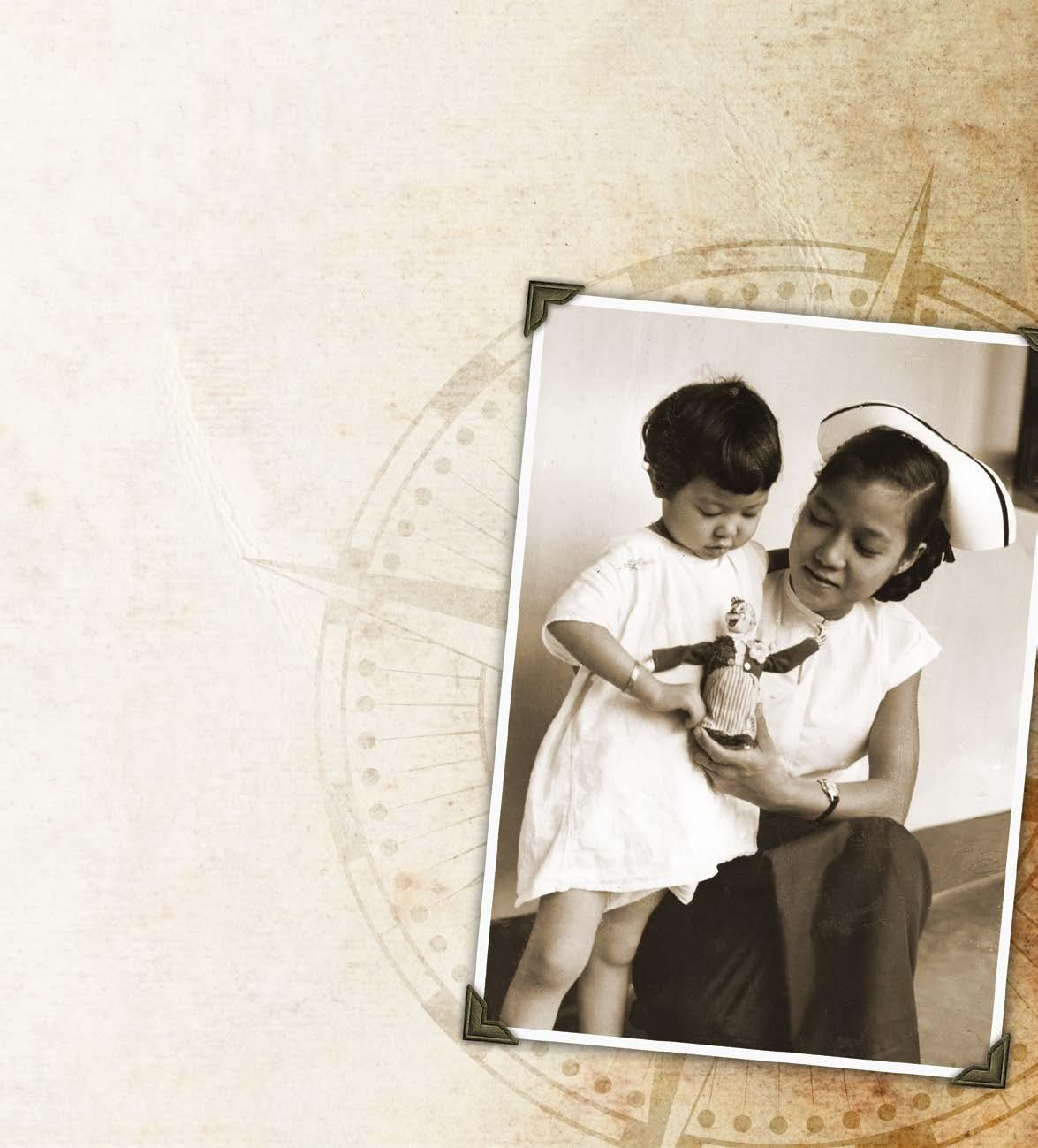
General Conference of Seventh-day Adventists 12501 Old Columbia Pike Silver Spring, MD 20904
mission work was the most important thing we did as a church? It still is.
Photo
courtesy of the Office of Archives, Statistics, and Research.












































 Reprinted with permission from Dynamic Steward magazine, vol. 24, no. 1.
Reprinted with permission from Dynamic Steward magazine, vol. 24, no. 1.



















































 Adapted from Mary Andrews: Companion of Sorrows by Carolyn Byers. This article originally appeared in the August 2010 KidsView. Used with permission. Photos: Center for Adventist Research at Andrews University.
Adapted from Mary Andrews: Companion of Sorrows by Carolyn Byers. This article originally appeared in the August 2010 KidsView. Used with permission. Photos: Center for Adventist Research at Andrews University.














